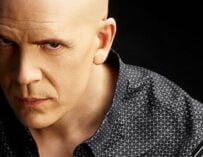
Warhaus’ Maarten Devoldere: “I’ll write hundreds of songs then select the 30 best ones”
We speak with Maarten Devoldere about his solo recording project Warhaus and his time spent fronting Belgian rock band Balthazar
Warhaus is the artistic alter ego and solo recording project of Maarten Devoldere who, along with Jinte Deprez, fronts the urbanely soulful Belgian rock band Balthazar. Quoting directly from DH Lawrence’s novel Lady Chatterley’s Lover for the title We Fucked A Flame Into Being, Maarten’s debut album as Warhaus was released last year and featured a number of superbly crafted singles – in particular, I’m Not Him and Memory which caught our attention and was selected as a #SongOfTheDay.
Shortly after, we took the opportunity to chat with Maarten and learned how he juggles playing in two bands, writes hundreds of songs and why you’re not likely to hear him singing songs in Dutch…
Before we talk about Warhaus, remind us how Balthazar started.
“We formed in high school, so that’s already 12 years ago. We made three records – the first one was six years ago, so the first six years we were just messing around. But we were touring almost non-stop, mostly in Europe, so we basically made the second and third records on tour or in the short periods in-between tours, at home.”
Has that act disbanded?
“No, no, not at all. It’s just because we were touring so much, we felt like we needed a break. It’s nothing special because it’s what every band does after a campaign with a record – they take breaks to make new records and that’s what we’re going to do. So in the coming year we’re going to make the fourth album and we’re going to release that at the beginning of 2018.
“But I was working on a side project for a couple of years as well, but I didn’t have the chance to release it because it was too busy. So now is the right time for me to finish the record and release it.”
Did you approach Warhaus in a different way to writing with Balthazar?
“Well, the big difference is that with Balthazar we have two songwriters – Jinte and me – so that’s a completely different dynamic and it’s really a team effort. You can compare it with The Beatles, or something, where we both sing as well. And I guess because it’s a band, you look for what binds you as a group and that’s how you’re going to sound. If you make a solo project you try to look for what sets you apart from the others, and with those small details in your personality, you’re going to exaggerate them. I would say a solo project is more versatile. And I think it you listen to Balthazar it sounds like a band, whereas with Warhaus it sounds like a singer or storyteller with an orchestra behind it.”
Do you prefer the solitude of writing on your own, or do you miss collaborating with the band?
“No, the preference is in the variation. After a while in Balthazar, I felt the need to have a solo project where I could explore these feelings. But at the same time, I wouldn’t want to do only Warhaus; I would miss playing in a band and cooperate on songs.”
How about with the songs themselves – do you deliberately aim to write material for each project or wait to see what comes out?
“It’s a bit of both, I guess. There was a certain mood I was at with the Warhaus record, so if I made a song that fitted, I automatically thought, ‘Oh this is going to be a Warhaus one.’ Then there’s the girl singing along [Sylvie Kresuch] so when it felt like a needed a female voice, then I put it with the Warhaus thing. When I started writing this album, I already had the title so I guess that pushed me in a certain direction. The record is a lot about desire and lust, and themes like that.”
Your lyrics are frequently explicit and confrontational, yet the melodies are accessible and appealing. Was that deliberate?
“Yeah, it’s not a super-commercial record but at the same time I don’t want to make an underground record. I think the biggest challenge is to combine some maturity with approachability. For example, one of my favourite Lou Reed records is Transformer, not Berlin. With Transformer it’s a classic, well done and tasteful, but at the same time it had Walk On The Wild Side that you could hear everywhere on the radio. I wouldn’t like it if I was an ‘elite’ artist that only made music that was too cultivated. For example, with Leonard Cohen they talk about what a great poet he is [was], but people tend to forget that he wrote beautiful melodies.”

Maarten: “The older I get the more efficient I get – as a songwriter you grow and you can select the good ideas faster”
Do you tend to start with a title and lyrics, or does the music come first?
“I start with the melody and chords. I’ll start writing on the guitar with the vocal melody. I’ll write hundreds of songs then select the 30 best ones and arrange them, and after that I select 10 for the record.”
That’s quite a volume of ideas you’re creating there. Do you treat songwriting like a job and keep working regularly?
“I used to be very disciplined as a young boy, but now I’ve lost a bit of that. At the same time, I feel the older I get the more efficient I get – as a songwriter you grow and you can select the good ideas faster. Whereas, five years ago it was harder for me to write and arrange 100 songs and let other people decide which ideas were good or not. And because we’re touring so much – it is interesting, but at the same time it’s not the most interesting, creatively – you have the time, but you’re not really in the flow.
“I do have a constant output. It’s not like I’m writing lots of songs for a couple of months and then no songs. I try to write nine-to-five, and I think that’s always good because the more you work the more you write. But at the same time, if you only have five minutes to grab the guitar, you can come up with a really good idea – and that never stops. Like, as a student it always struck me that I would write more when I had exams, because you didn’t have much time. And if you have lots of other things going on in your life, then in the short time you have to create something, you’ll squeeze everything out of it.”
How about with your lyric-writing, do you pore over every word?
“Yeah I do. Sometimes you’re lucky and it goes very fast, but most of the time it’s hard work! It’s like if you compare Leonard Cohen and Bob Dylan, I think I’m like Cohen in that I think over every word a hundred times, and I rewrite a lot. Also with arrangements, it’s possible that I’ll make 15 versions of the same song with different grooves and instruments. It’s a bit trial and error sometimes.
Do you always sing and write songs in English?
“Yes only English. I’m Dutch-speaking and it’s such a small language in the world, so we grow up with English TV, we don’t really have anything Dutch on television, or anything. And as a kid I was only a fan of all English bands – we have some Dutch bands but they’re not very common. Also I’ve got a very severe Dutch accent because I’m from Flanders, so if was to sing in my accent nobody further than 50 kilometres from Flanders would understand me!
“I’ve read lots of English books to help me and while I’m reading I’ll take notes, so that can help to find inspiration for lyrics. Not to steal whole sentences, but to learn how you can verbalise some feelings and things like that.”
Looking forward, are you thinking about the next Warhaus album at all, or will you be concentrating on Balthazar?
“I’m always writing songs, so like I said, it never stops. After the next Balthazar album I will see, it’s a bit early to say. But we’re already playing some songs live that aren’t on the album, and I like that a lot.”
Interview: Aaron Slater
Warhaus’ debut album We Fucked A Flame Into Being is out now through Play It Again Sam. Find out more at: warhausmusic.com



































Related Articles